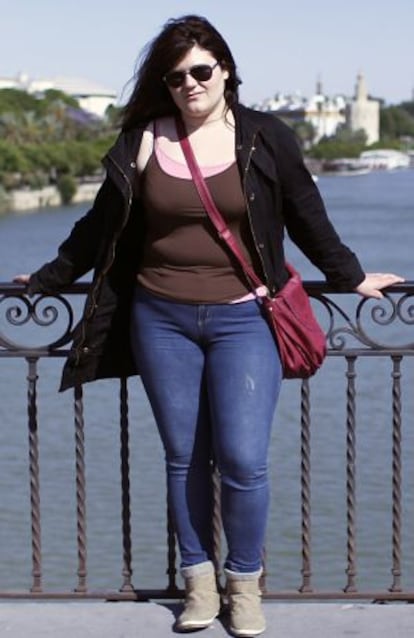The graduates caught in a debt trap
Unemployment crisis means that many former students can't pay back loans PP government has since abolished the lending program altogether


This year, the 2,235 graduate and PhD students who took out a loan from the Education Ministry for the 2010-2011 semesters will have to start paying back around 300 euros a month. But in a country with nearly six million unemployed, finding a job is almost a miracle, and that's despite the fact that these university students long ago gave up on finding work in line with their level of education. Right now they would gladly accept a job as a waiter, a supermarket cashier, a telephone operator... anything.
That is why they have created the Platform for Victims of University Loans, a support group that is aiming to draw attention to their desperate plight.
The ministry says that it is aware of the problem and that it is committed to finding a solution, although it cannot provide figures on the number of loan defaults. A spokesperson drew attention to the complexity of an issue that involves so many factors: the ministry itself, which put forward the money; the ICO, a government credit agency; the banks, which acted as middlemen; and finally, the 2,235 borrowers. Sources at the ICO say that they will follow the guidelines set by the ministry.
The students say that they want to pay back their loans, but that in the current "state of emergency" they want a moratorium until the crisis lets up, or else they want the same loan conditions granted in previous years. When this program began in 2007, the conditions were that loan repayments would start after three years - or when borrowers earned more than 22,000 euros a year - with no interest and over a 15-year period. After that, if their income was still too low, the debt would be canceled out. The state was the guarantor.
"I could pay if it were €100"
Ana Belén Sierra, who comes from the Seville neighborhood of Triana, studied Art History on a scholarship, and dreamed of pursuing a master's degree in archeology. Halfway through the year her scholarship fell through due to "lack of academic merit." "I wasn't expecting that," says Ana Belén, 28. "So I thought, what do I do? Quit halfway through or ask for a loan? I asked for the loan."
Since September 2011, her only jobs have been a two-month stint making pizzas for 250 euros a month, answering the phone six days a week, and a scholarship at a museum that paid her 300 euros a month. "Supermarket managers tell me that I have too much training. And I reply that I also have to put food on the table. I've occasionally dumbed down my résumé in order to find a job, but then they don't call you because you have no experience."
On June 17, Sierra has to start paying back her loan at a rate of 250 euros a month. She has warned the bank that there is no way she can do that. "If it were 100 euros, between my scant savings and help from my family I could do it," she says. In the meantime, she is hoping to find work abroad.
But for the 2010-2011 academic year, the clauses became tougher. Loans for a one-year master's degree would have to be returned starting two years after graduation (or three years in the case of a two-year degree). Borrowers only had four years to return the loan, which was a maximum of 15,600 euros for a one-year course and 28,000 euros for two years. Then, suddenly, during the last academic year, the Popular Party government eliminated the loan program altogether.
Everyone who was interviewed for this story said the same thing: "We were told that it was essential to get training in order to find a job, but now we are out of work and laden with debt."
The sisters Celia and Irene Alonso are not twins, but they might as well be. They are aged 28 and 27, they are both architectural technologists and they have completed two master's degrees in occupational hazard prevention and building management. Their father is a pensioner and their mother runs a bar that has seen better days in Las Cabezas de San Juan, a small town near Seville. The family is already paying 1,000 euros a month after mortgaging their home to buy "a little field." So there is nothing left for the sisters' 600-euro monthly installments.
"My father is very concerned that we'll be placed on the defaulter list and that our bad credit history will prevent us from taking out more loans in the future. The bank has scared us," says Celia.
During all this time, the only jobs they have found were as clerks at a sports store, where they made 350 euros a month. They spent it on moving from Las Cabezas to Seville for their studies. "What little money we have left, we will spend in September. We're leaving for Manchester, to try our luck there. We have a friend there working in the hotel trade. The idea is to improve our English, and when we are completely fluent, to look for jobs in our specialty," says Celia, who is ever the optimist.
The biologist Mamen Carrillo can ill afford to repay her loan either. She used to teach workshops to unemployed people until the crisis hit. She then moved to Cádiz to study a master's degree in aquafarming and fisheries - "I always wanted to work in something related to the sea" - and she requested the biggest loan available to cover her living expenses. But she never found a job, and has since moved back with her parents in Granada. "On top of that, I was supposed to pay 300 euros a month, and instead I am being charged 335. I called up the bank and they said they have no idea what's going on. At home, only my father has a job, and I have a sister who is studying."
David Martín is the mastermind of the Platform group, which already has more than 500 followers on social networking site Facebook. "Well, a master's degree in communication had to be good for something," laughs this hyperactive journalism graduate, who has no place of his own and usually crashes at friends' houses. He is not in touch with his family, and still gets angry when he remembers what the ICO worker told him when he said he could not pay back the loan: "Have your mother repay it." "I knew what I was getting into," he says. "I wasn't tricked or anything like that. I am simply surprised at the ICO's current lack of flexibility, given the 27-percent jobless rate, which is nearly 60 percent among Spain's youth. The government sold the loans well back then, but it made conditions tougher under the table."
The dangers of a "university bubble"
In theory, a student loan system can improve access to education without forcing the government to immediately spend the kind of money required by a strong scholarship network. This money can instead be invested in improving the running of a university, which can raise tuition fees without losing students.
Furthermore, the theory goes (and there are numerous OECD reports based on this), the government only needs to invest as much as necessary into the loan program to ensure that credit is awarded under favorable terms: low interest rates, a repayment threshold under which borrowers do not have to return the money, and even loan write-offs for students with low incomes and very good grades.
In practice, however, this model can spin out of control and result in students up to their necks in debt. This is the case in the United States, where President Barack Obama stepped in two years ago to essentially bail out students and graduates who owe banks more than 780 billion euros in loans. Some academics are talking about a "university bubble," in which young people wildly overpaid for academic degrees that no longer grant them access to the kinds of jobs they were expecting; instead, they will be paying back the loans for many years to come.
Now, experts such as Peter Lampl from Sutton Trust, a private group that fosters access to education for students from non-privileged backgrounds, fear that the same thing will soon happen in Britain. Two years ago, the national student loan policy changed and now stands as follows: no student pays in advance unless they want to; repayment begins after graduation, when the borrower is making at least 21,000 pounds a year (26,250 euros). The interest rate is three percent plus inflation, and the annual repaid amount cannot represent more than nine percent of the borrower's annual salary.
The lowest-income students pay nothing (the loan becomes a scholarship), but for the others, tuition will be much more expensive: up to 11,250 euros a year (in 1998 it was just 1,250 euros by comparison). Even in Australia, a role model for student loan policies, experts have warned about the growing pressure to raise tuition rates. Collective student debt in that country is 20 billion euros.
Going back to the theory, loans should be well balanced out by scholarships. Yet several reports by the European Student Union (ESU) note that in countries with growing loan programs, scholarships end up being reduced, says Fernando Galán, of ESU's executive committee. In the end, the lower portion of the middle class gets left out of the system because of the requirements for scholarship application and the fear of being unable to return the loan.
Tu suscripción se está usando en otro dispositivo
¿Quieres añadir otro usuario a tu suscripción?
Si continúas leyendo en este dispositivo, no se podrá leer en el otro.
FlechaTu suscripción se está usando en otro dispositivo y solo puedes acceder a EL PAÍS desde un dispositivo a la vez.
Si quieres compartir tu cuenta, cambia tu suscripción a la modalidad Premium, así podrás añadir otro usuario. Cada uno accederá con su propia cuenta de email, lo que os permitirá personalizar vuestra experiencia en EL PAÍS.
¿Tienes una suscripción de empresa? Accede aquí para contratar más cuentas.
En el caso de no saber quién está usando tu cuenta, te recomendamos cambiar tu contraseña aquí.
Si decides continuar compartiendo tu cuenta, este mensaje se mostrará en tu dispositivo y en el de la otra persona que está usando tu cuenta de forma indefinida, afectando a tu experiencia de lectura. Puedes consultar aquí los términos y condiciones de la suscripción digital.








































